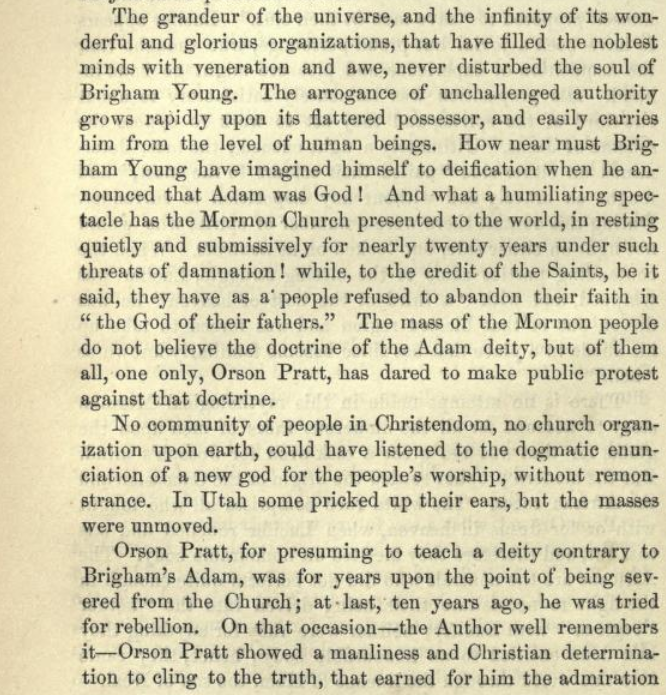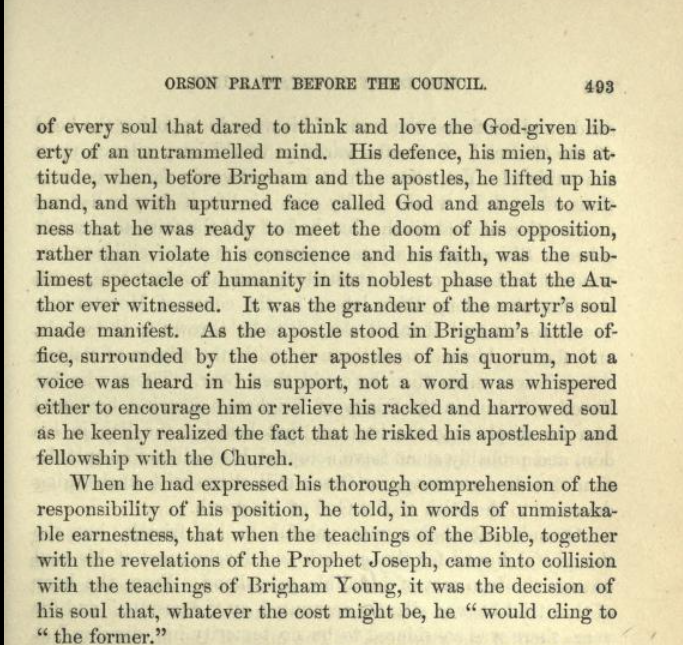T.B.H. Stenhouse, in a work critical of the Church, notes that the majority of members do not believe Adam is God; notes conflict between Brigham and Orson concerning doctrine.
- Type
- Book
- Source
- T. B. H. Stenhouse ExcommunicatedCritic
- Hearsay
- Direct
- Reference
T.B.H. Stenhouse, The Rocky Mountain Saints (New York: D. Appleton and Company, 1873), 492-93
- Scribe/Publisher
- D. Appleton and Company
- Audience
- Reading Public
- Transcription
The grandeur of the universe, and the infinity of its wonderful and glorious organizations, that have filled the noblest minds with veneration and awe, never disturbed the soul of Brigham Young. The arrogance of unchallenged authority grows rapidly upon its flattered possessor, and easily carries him from the level of human beings. How near must Brigham Young have imaged himself to deification when he announced that Adam was God! And what a humiliating spectacle has the Mormon Church presented to the world, in resting quietly and submissively for nearly twenty years under such threats of damnation! while, to the credit of the Saints, be it said, they have as a people refused to abandon their faith in "the God of their fathers." The mass of the Mormon people do not believe the doctrine of the Adam deity, but of them all, one only, Orson Pratt, has dared to make a public protest against that doctrine.
No community of people in Christendom, no church organization upon the earth, could have listened to the dogmatic enunciation of a new god for the people's worship, without remonstrance. In Utah some pricked up their ears, but the masses were unmoved.
Orson Pratt, for presuming to teach a deity contrary to Brigham's Adam, was for years upon the point of being severed from the Church; at last, ten years ago, he was tried for rebellion. On that occasion—Orson Pratt showed a manliness and Christian determination to cling to the truth, that earned for him the admiration of every soul that dared to think and love the God-given liberty of an untrammelled mind. His defence, his mien, his attitude when, before Brigham and the apostles, he lifted up his hand, and with upturned face called God and angels to witness that he was ready to meet the doom of his opposition, rather than violate his conscience and his faith, was the sublimest spectacle of humanity in its noblest phase that the Author ever witnessed. It was the grandeur of the martyr's soul made manifest. As the apostle stood in Brigham's little office, surrounded by the other apostles of his quorum, not a voice was heard in his support, not a word was whispered either to encourage him or relieve his racked and harrowed soul as he keenly realized the fact that he risked his apostleship and fellowship with the Church.
When he expressed his thorough comprehension of the responsibility of his position, he told, in words of unmistakeable earnestness, what when the teachings of the Bible, together with the revelations of the Prophet Joseph, came into collision with the teachings of Brigham Young, it was the decision of his soul that, whatever the cost might be, he "would cling to "the former."
- Citations in Mormonr Qnas
The B. H. Roberts Foundation is not owned by, operated by, or affiliated with the Church of Jesus Christ of Latter-day Saints.


